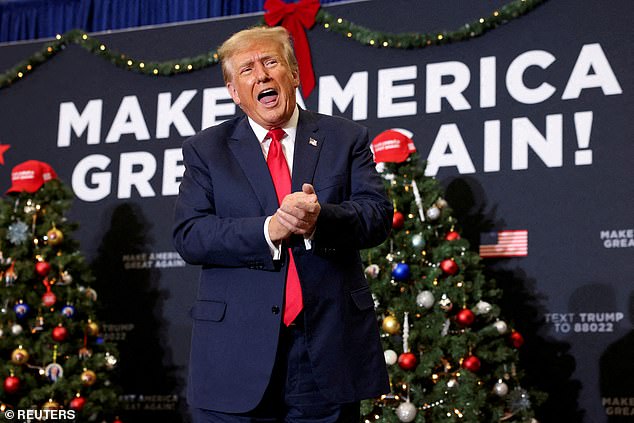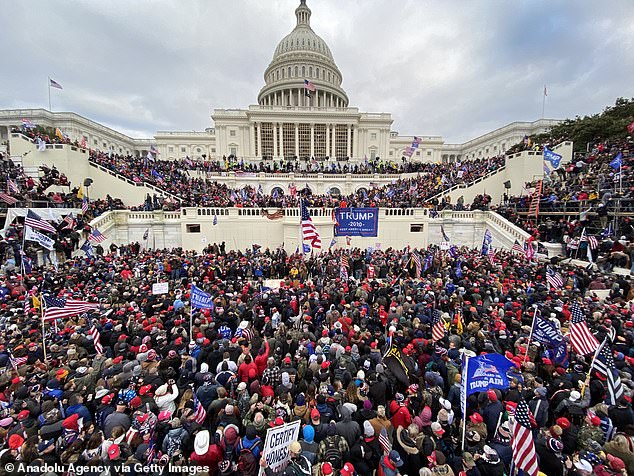Special Counsel Jack Smith asks court to reject Donald Trump’s claim of ‘absolute immunity’ on Jan. 6 charges and says granting presidents such power would be ‘dangerous’
- Smith argued in a Saturday filing for an appeals court to dismiss Trump's claim
- Trump argued that he has presidential immunity for his actions during the Capitol riot
- Prosecutors say such a legal shield 'would be particularly dangerous'
Special counsel Jack Smith on Saturday urged a federal appeals court to reject former President Donald Trump's claim that he has presidential immunity from criminal charges over efforts to overturn his defeat in the 2020 election.
Smith, who is overseeing the prosecution, argued in a lawsuit that nothing in the Constitution or American legal tradition supports giving former presidents “absolute immunity” from criminal prosecution for actions taken while in office.
Smith said creating such a legal shield would place presidents above the law, a precedent he said “would be particularly dangerous.”
Trump has claimed that the presidency is “cloaked in absolute immunity” from prosecution, Smith said. “He's wrong.”
Trump, the front-runner for the 2024 Republican presidential nominee, is appealing a lower court ruling denying his attempt to dismiss the election charges based on his claim of immunity.
Special counsel Jack Smith urged a federal appeals court on Saturday to reject former President Donald Trump's claim that he has presidential immunity from criminal prosecution.

Trump, the frontrunner for the 2024 Republican nomination, is appealing a lower court ruling denying his attempt to dismiss the election charges based on his claim of immunity
His lawyers argued in a December 23 filing that the presidency would be undermined if Trump were indicted for conduct related to his official responsibilities.
Smith argued that the separation of powers imposed by the Constitution and legal precedent make clear that a former president can be indicted for crimes he committed while in the White House, “including, most critically here, illegal acts to stay in power despite losing elections. '
A three-judge panel of the U.S. Court of Appeals for the District of Columbia Circuit will argue the case on Jan. 9.
The outcome of the dispute is crucial for both sides, especially since the case is essentially on pause while Trump advances his immunity claims to the appeals court.
Prosecutors hope a quick ruling rejecting those arguments will restart the case and keep it on track for a trial, currently scheduled for March 4 in federal court in Washington.
But Trump's lawyers will benefit from a lengthy appeals process that could significantly delay the case and possibly push it past the November election.
Trump's lawyers argue that the appeals court should order the dismissal of the case, arguing that as a former president he is immune from prosecution for actions that fell within his official duties as president.

His lawyers argued in a December 23 filing that the presidency would be undermined if Trump were indicted for conduct related to his official responsibilities.
Trump has denied guilt on charges that he defrauded the United States, obstructed Congress and violated voters' civil rights through plans to overturn his loss to Democrat Joe Biden.
The case is one of four criminal charges Trump faces and one of two related to his alleged efforts to undermine the 2020 election. He has pleaded not guilty in all cases and denies any wrongdoing.
Trump, the front-runner for the Republican presidential nomination, has accused prosecutors of a politically motivated effort to damage his campaign for the 2024 election. The state-by-state contests to select a GOP nominee begin January 15.
The timing of the court's ruling is seen as crucial to whether Trump will stand trial as planned from March. Progress in the case has been halted while the immunity appeal is still pending.
Smith asked the U.S. Supreme Court earlier this month to bypass the lower appeals court and rule on the issue immediately, in an effort to stave off Trump's attempt for a delay.
The Supreme Court denied the request, leaving the issue to the DC Circuit Court for now.
